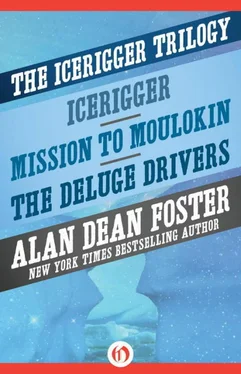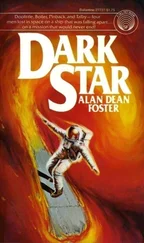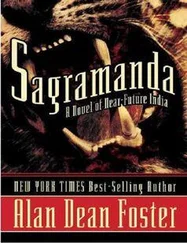Ethan and the others agreed readily. Though Elfa and Hunnar and a few of the more educated Tran were equipped to combat superstition and rumor, the average sailor was not. Tell them that according to the Saia they were about to enter the lands of the dead and confront the spirit world, and the Slanderscree might find itself moving in the wrong direction. Whether man or Tran, a storm is easier to combat than the fears dwelling in the depths of the mind.
Sails were reset and once again the icerigger commenced rumbling uphill. Two days later the mists started to thin. Once Ethan thought he spied an ellipse formed of neatly crafted wooden houses. They were nothing remarkable, but they were radically different from the familiar heavy-beamed, stone dwellings of all other Tran. He did not mention the sighting or his observations to the still sulking Williams.
The mist did not disperse gradually. They reached a point where it stopped clean, a slightly oscillating wall of steam. From then on they saw no more signs of the Golden Saia. Some day Ethan would return and listen to the long legends of a misplaced people. So he told himself. He was not honest enough to admit that once back in the comfortable hub of Commonwealth civilization, he would likely forget all but memories of Tran-ky-ky.
For now, he forced his attention outward. They had a confederation to expand, a union of ice to cement, and they did not have a lifetime in which to do it.
Grass turned yellowish and scraggly. Trees gave way to bushes, and ferns and flowers vanished behind them. The Slanderscree had emerged on a high, rolling plain. As they lumbered across bare gravel and tormented grasses, the wind began to rise, an old companion back from unwilling vacation. Soon it was blowing at familiar strength. The Tran found it comforting.
None of the crew had been lost in the transit, though Eer-Meesach was still treating the most severe cases of heat-stroke in the central cabin. The temperature fell and the humans had long since redonned their survival suits, the Tran their heavy hessavar fur coats.
They received no visits from the spirits of the dead or otherwise. The most notable spirits aboard, those of the sailors, had risen considerably with the return of a congenial climate. The rolling landscape mounted into steep hills to the north and east. After consultation with Ta-hoding, it was decided to turn southward. They would eventually reach the western edge of the plateau. Then they could begin hunting for a way down.
As the wind increased, so did their speed. Before long they were traveling at a pace short of breathtaking but quite respectable. It didn’t take long for everyone on board to grow accustomed to the domesticated thunder of the twelve huge wheels.
Yellowish grass continued to speckle the plain, fighting to stay rooted in the sparse soil. The raft’s chief cook tried some in a meal one night, and though it was pronounced edible by all who tried it, there was no rush to harvest. It proved tough, tasteless, and hard to digest.
In days of traveling they saw nothing that resembled a tree. The closest approximations were widely scattered, meter-high bushes which looked like umber tumbleweeds. Their tightly intertwined branchlets had the consistency of wire. Ethan wanted to use a beamer to cut a sample and for a change, it was Williams who protested. Eying the isolated, unimpressive clump he said, “Anything that can survive in this desolation deserves to remain unharmed.” And Ethan put his beamer away.
The wind was steady and predictable. That gave the sailors needed time. They learned fast, but handling a ship the size of the Slanderscree on land was a different proposition from doing so on ice.
Ethan spent much time watching the parade of distant hills and thought of the Golden Saia. Taken theoretically, he supposed it was possible for the spirits of the departed to linger in some outrageously incomprehensible mode—that they would congregate like so many conventioneers seemed impossible. And if they were so inclined, why choose a region as unattractive as this? True, the Saia had remarked on their desire for privacy, and this vast plateau would certainly provide that, but—
He stopped himself in the middle of a thought. Endless days of dull landscape had lulled him into compensating with steadily growing rococo imaginings. There was nothing out there but scattered wire-brushes and poverty-stricken grass.
Nothing.
“Enormous ice-raft? What enormous ice-raft? Truly are your fantasies entertaining, my guests!”
K’ferr Shri-Vehm, Landgrave of Moulokin, eyed her visitors pityingly. “You make senseless demands of me and my people, you attack us at the first gate, and now I find the basis for these actions are only dreams of wandering minds. Your information is false, visitors.”
“Hedge not with us.” The voice was edgy, nervous, dangerous. “Where have you hidden them?” Rakossa of Poyolavomaar sent quick, jerking glares around the modest throne-room, as if the Slanderscree might be tucked in a corner or secreted behind a chest.
K’ferr made the Tran equivalent of a laugh. “ Hidden, my lord Rakossa? Hidden such a great vessel as you describe? Where would we conceal such a craft?”
“You could have dismantled it, moved the sections somewhere.”
“In less than four days? I venture, my lord, you have an imagination second to none.”
An officer of the Poyolavomaar fleet chose that moment to enter the chamber. “The ship we seek is not anywhere in the harbor, sires. ’Tis nowhere to be found, nor, as some suspected, is there a cave in the cliffs large enough to hide even part of such at large raft. We also ventured far up the main canyon and saw no sign of it.” What he said was true; what he didn’t know was that the Moulokinese had used scrapers and torches to obliterate the tell-tale tracks marking the Slanderscree ’s passage. “I do not think, sire, that—”
“We are not interested in what you think!” a furious Rakossa shouted.
“Did you not see,” K’ferr continued, “the great raft we ourselves are building? That is what formed the tracks outside our canyon you seem to find so absorbing.”
“We saw,” said a different voice. Calonnin Ro-Vijar stepped forward. “Wooden runners of that size will not support a vessel of a size necessary to make them worth constructing.”
“Our profession as a city-state, and one for which we are justly famed, is raft-building.” Mirmib stared condescendingly at Ro-Vijar. “What you say may be true, but we often begin such new raft shapes and sizes by way of experimentation. We learn much that is valuable to us in our trade, even if the actual concept eventually proves unworkable. Is this Arsudun from which you come also a specialist in the construction of rafts?” “No, but—”
“Then do not presume to pronounce judgment on a craft with which you are not conversant.”
Ro-Vijar started to say something, then hesitated. When he spoke again, it was in a surprisingly apologetic fashion. “’Tis evident we have made an error in offending and accusing these people, Lord Rakossa. We may best continue our hunt elsewhere.”
“The tracks lead here!” Rakossa threw arms and words about careless of who they struck. “They are here somewhere, magicked or otherwise.”
“Do you think they rose into the air and sailed away thusly, my good friend?” Ro-Vijar asked. The comment, made in jest, inspired a horrible thought in the Landgrave of Arsudun. For an instant he thought the humans might somehow have obtained one of their powerful sky-rafts and transported it here. He had been told by the human commissioner, Jobius Trell, that the skypeople possessed vehicles capable of transporting an object even as massive as the vanished icerigger through the air. While he had never seen such a device, he was inclined to believe whatever Trell told him about human technological capabilities. Trell had undoubtedly lied to him about many things, but not about that.
Читать дальше










